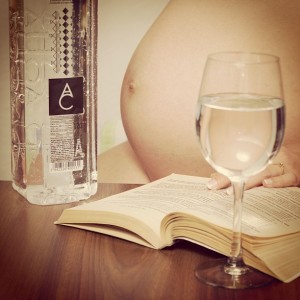Hydration is essential in any stage of our life and all the more so during the pregnancy as the water is a key element in the foetal development. If for the child the water is important in its development (at birth, the babies have more than 70% water in their tissues), for the mother the water cleanse the toxins accumulated in the body, the highest risk of dehydration during hte pregnancy being toxaemia –accumulation of toxins in blood, that leads to preeclampsia and eclampsia, depression, kidney and hepatic disorders or even to premature birth or miscarriage in severe cases.
As the body is in a special state, the water consumption is different, namely the quantity of water consumed should be increased in order to ensure comfort and the hydration required for foetal development. Moreover, dehydration, even minor, increases the tiredness that any pregnant woman feels to various extents. Additionally, during this period urination is more frequent, so more water is lost and the risk of urinary infections is higher, but the supplementation of water consumption may remove this risk as well as other pregnancy complications such as, for example, water retention. Paradoxically, a larger quantity of water prevents water retention because the body no longer feels the need to store water.
The water carries the body nutrients. Water aids in transferring everything in blood and then in placenta: absorption of essential nutrients, vitamins, minerals, hormones and everything the foetus needs for growing. Also the water protects you from headaches and adjusts body temperature that rises in the months of pregnancy.
Proper hydration contributes to skin elasticity and can play an extremely important role in the skin appearance after the pregnancy. Stretch marks appear when the skin is not sufficiently elastic and cannot sustain a volume growth and breaks. Besides oils and other external treatments, the inside water fights efficiently against these unaesthetic traces.
In addition to the 2 litres regularly recommended, during the pregnancy it would be ideal to add at least half a litre, and the diet consist of fresh water-rich fruits and vegetables – watermelons, tomatoes, cucumbers, pomegranates, kiwi, cherries – but also vegetable soups, lemonade and fruit or herbal tea that does not affect the pregnancy. As coffee is a diuretic it would be ideal to give it up, but also alcohol as both of them affect the fetal development.
In order to constantly maintain hydration we advise pregnant women:
– to always have water within reach in order to be easily remembered to drink
– not to wait to feel thirsty: thirst appears only when the body is already dehydrated with minimum 1%
– to drink water after each time you go to the toilet, constantly and in small mouthfuls
– if the taste of the water is not sufficient, they can add fruits or lemon into the glass for a discrete flavour
– if they normally drink mineral water, to choose a naturally sparkling water.
– if they forget, they could install on their phone an application that reminds them to drink water every hour.
The water purity is also very important: the water nitrates are transmitted to the foetus and can affect its development because they impact the blood oxygenation. Therefore, choose a bottled mineral water having a low nitrate concentration, like AQUA Carpatica.
We wish an easy pregnancy to all moms who are reading this article.







